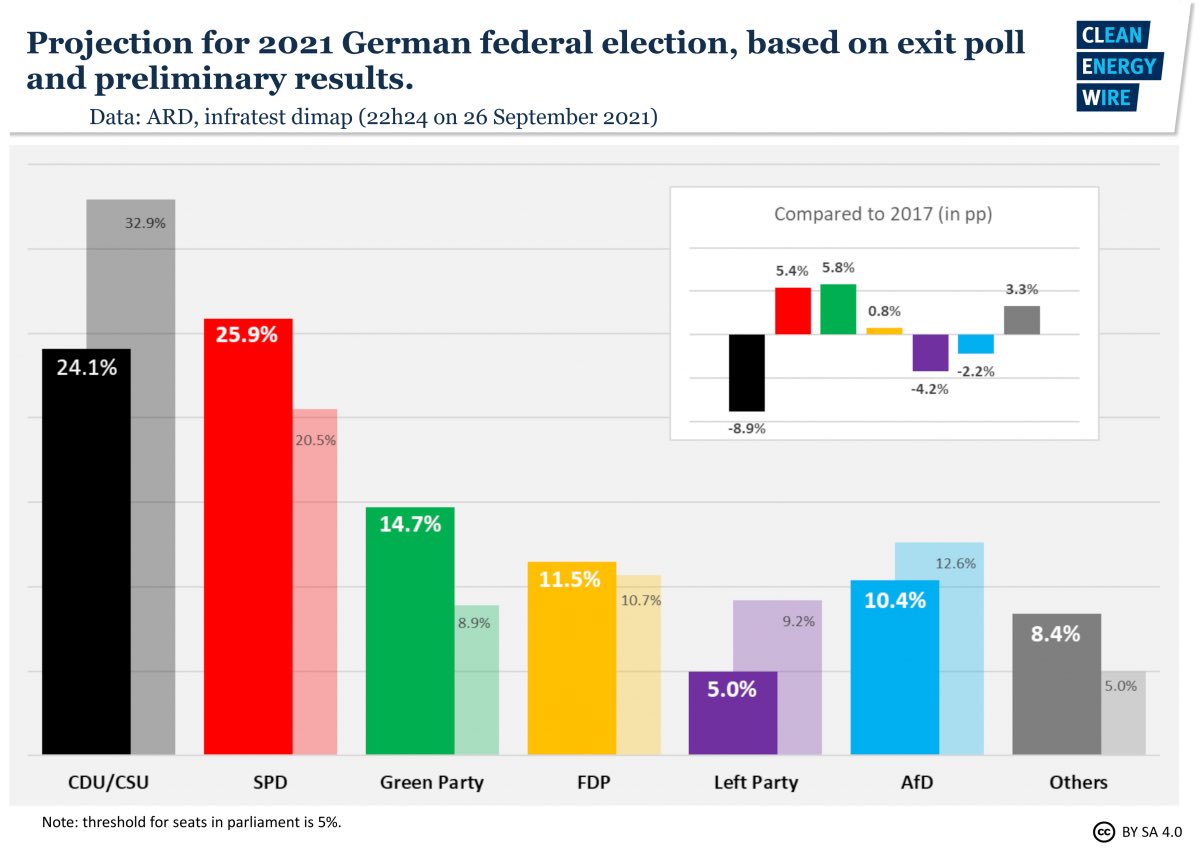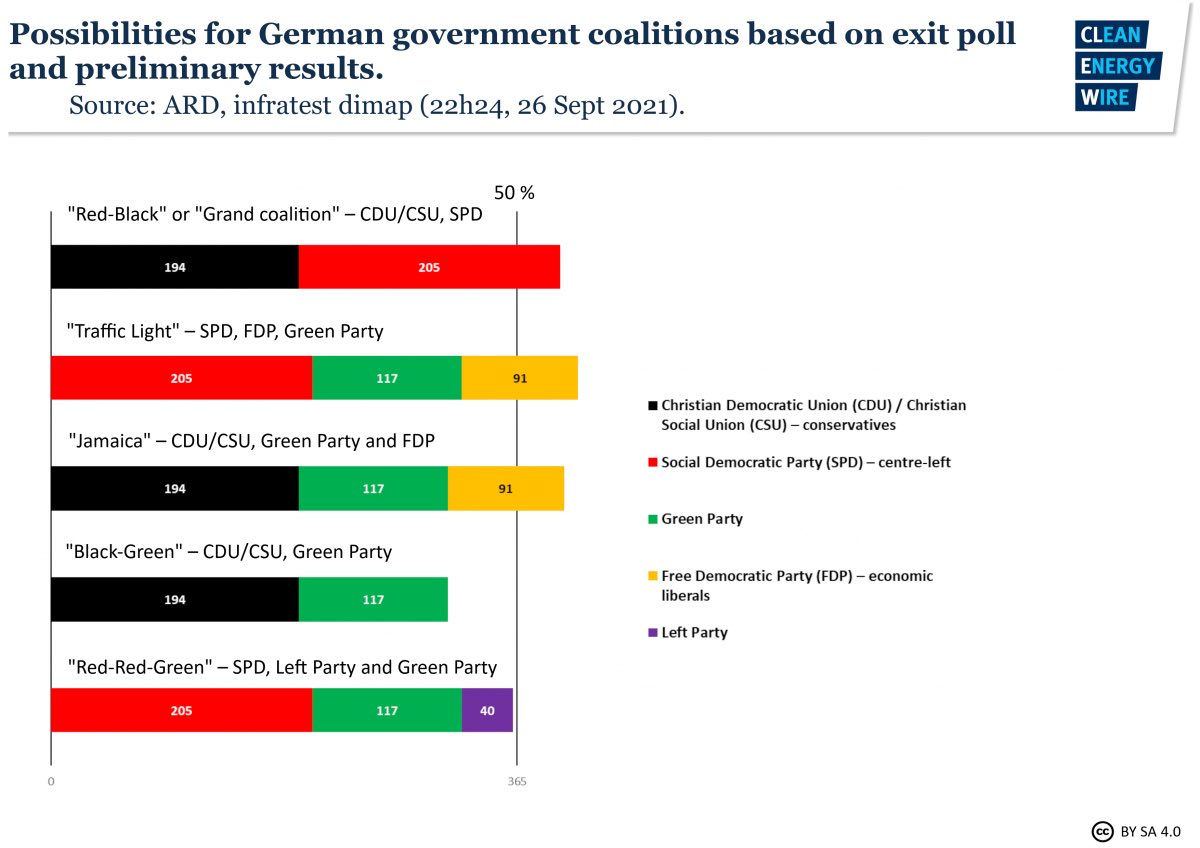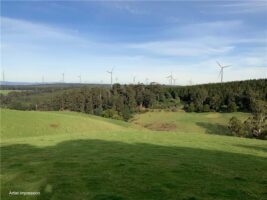The Social Democrats with chancellor candidate Olaf Scholz appeared to score a narrow victory in Germany’s federal elections following historic losses for the conservatives.
The conservative alliance of CDU and its Bavarian sister party CSU with chancellor candidate Armin Laschet fell to a record low at around 24 percent and projections in the evening showed the Social Democrats (SDP) under chancellor candidate Olaf Scholz with a slight lead at around 26 percent.
At 14 percent, the Green Party achieved the best result in the party’s history and is set to become the third strongest camp in the next federal parliament, with gains of about five percentage points compared to 2017.
It is followed by the pro-business FDP with almost 12 percent and the far-right populist AfD with about 11 percent. It was unclear whether the Left Party would reach the 5-percent threshold to enter parliament. Final results are expected to come later than usual after a lot of voters opted for postal vote.
All major parties vowed to make climate action a central focus of the next government. Current finance minister Scholz, who emerged as the surprise favourite among voters during the campaign, said it was his intention to form a climate government that would speed up renewables expansion.
Laschet said Germany needed “a coalition for more sustainability in every sense, in climate action and finances.” He added the government had a responsibility for future generations. “We have to meet this responsibility better than so far, in particular in climate action.” The Greens’ Annalena Baerbock said: “This country needs a climate government, that is the result of this election.”
NGOs also said the election will result in more climate action. “It’s already clear: The climate is the winner of this election,” said Kai Niebert, president of the environmental umbrella organisation DNR. “It’s no longer a green topic, but one of all democratic parties.”
Three-way coalition on the horizon
The close result leaves open who could lead the next government and follow as chancellor on Angela Merkel, who is stepping down after 16 years in power. Both Scholz and Laschet said they hoping to establish a new government by Christmas.
Together with the pro-business FDP, the Greens will be key actors in the expected coalition negotiations. The results indicated that a three-party coalition of either CDU/CSU or SPD with Greens and pro-business Free Democrats seem the only viable options to form a government.
In their first televised meeting two hours after the poll closed, Scholz and Laschet both acknowledged that the next government would very possibly be resting on a three-party coalition, thereby giving a cautious rejection of a renewed grand coalition between SPD and conservatives.
This could make the FDP the kingmaker of a three-party government formed either by the SPDwith the Greens or the CDU–CSU with the Greens. FDP leader Christian Lindner and the Greens’ Baerbock both suggested that their parties should initiate talks, instead of negotiating first with either SPD or conservatives, in order to find common ground for a coalition.
Creating the next German government “is not about finding the lowest common denominator [between parties] but about setting the course for the future of this country,” Baerbock said. The FDP‘s Lindner said: “I think the next government will be much more ecological. We have to take note of the Greens’ election result.”
The parties will have to overcome differences which could lead to drawn-out coalition negotiations. The Greens have favoured an early deadline for the coal exit and an end date for the sale of combustion engine cars.
Like the SPD, they favour large-scale investment programmes, funded potentially through government debt or higher taxes. The Free Democrats have ruled out bans or tax increases, calling for technology-open, market-based solutions, and like the conservatives have vowed to ensure stable public finances.
Conservatives score worst result ever in “climate election”
Irrespective of the exact distribution of votes, the CDU/CSU recorded the worst result in the party’s history and shed nine percentage points compared to last election in 2017. The SPD on the other hand achieved a spectacular comeback, adding some five percentage points thanks to the growing popularity of its candidate Scholz after trailing the conservatives and also the Green Party for the better part of the past year.
The 2021 vote has often been labelled a “climate election”, and throughout the campaigns climate action featured high in the debates and party programmes. The issue gained additional prominence after deadly floods in Western Germany in July, which scientists attributed to climate change.
Climate activists and researchers still criticised the lack of ambition and hundreds of thousands of mostly young people took the streets to call for more climate action two days ahead of the election. Surveys at the polls also confirmed that climate change ranked again among voters’ top concern.
However, most voters ultimately did not base their decision on the most ambitious climate policies and rather opted for continuity. After all major parties offered some solutions and the most popular candidate, Scholz, presented himself as “chancellor for climate protection.”
The pro-business party FDP under its leader Christian Lindner scored just under twelve percent, more or less keeping its share of the vote unchanged from the last election. The FDP had positioned itself as the party of “economic reason” and freedom, rejecting bans and tax hikes should they become part of a government.
Economist call for climate action priority
Economists called on the next German government to make climate protection a priority and use CO2 pricing as the guiding instrument.
Veronika Grimm from the German Council of Economic Experts and Ottmar Edenhofer from the Potsdam Institute of Climate Impact Research (PIK) also emphasized the need for international climate cooperation, for example through the creation of a so-called ‘climate club’ between Europe, the US and China.
“All of this applies regardless of which coalition is now formed. For all parties face the same challenge: limiting climate hazards such as floods and heat waves, and speeding up climate policy as economic policy,” Edenhofer stressed
Source: Clean Energy Wire. Reproduced with permission.










